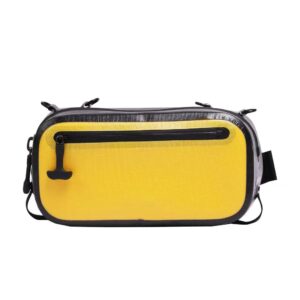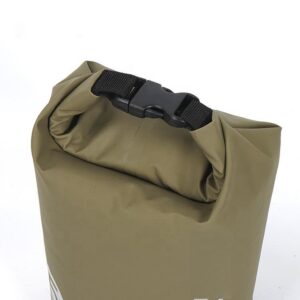Amid the scorching days of summer, cooler bags emerge as indispensable companions for outdoor activities, not only providing chilled beverages but also preserving the freshness of food. However, with increased usage, cooler bags may encounter issues of residual stains and unpleasant odors, disrupting the normal user experience and potentially posing health risks. This article aims to furnish you with the ultimate guide to cleaning cooler bags, helping you effortlessly address stains and odors to maintain a fresh and hygienic interior.
Causes of Cooler Bag Contamination
As mentioned earlier, cooler bags are essential tools for summer living, and the dual impact of frequent usage and high temperatures can lead to the accumulation of substances and odors, primarily attributable to:
Food Residue
Cooler bags are commonly employed to carry various foods, and leakage or residual food particles in containers, especially from liquid foods, can result in challenging-to-clean residues.
Elevated Internal Temperatures
Rising temperatures, particularly during outdoor activities in summer, create an ideal environment for the residual food particles to deteriorate, fostering the growth of bacteria and generating odors and substances.

Inadequate Thorough Cleaning Over Time
Due to frequent use, many individuals fail to promptly clean cooler bags after each use, allowing food residues to solidify and form stubborn substances that become increasingly difficult to clean over time.
Hazards of Neglecting Timely Cleaning
If the stains inside the cooler bag are not promptly cleaned, it can have adverse effects on both our health and the freshness of the stored food. On one hand, the stains become more challenging to clean, and on the other hand, the resulting unpleasant odors impact the user experience. Most importantly, it can affect the freshness of the food and compromise our dietary health and safety.
Therefore, regular cleaning of cooler bags is essential to maintaining hygiene and is a key factor in extending their lifespan. The following are guidelines for cleaning cooler bags.
Guidelines for Stain Removal in Cooler Bags
Adhere to Proper Usage Standards
To prevent cooler bag contamination, strict adherence to usage standards is crucial. Use leak-resistant containers for food partitioning, place commonly used items on top, and minimize frequent removal and insertion of items to reduce the risk of food leakage and bag contamination.
Maintain Daily Cleaning
It is crucial to clean the interior stains every time the cooler bag is used. Wipe the interior with antibacterial spray or cleaning solution, use a damp cloth for external cleaning, and open the bag’s seal to allow ventilation. While this may seem tedious for frequent cooler bag users, it is a vital step in preserving the bag’s lifespan.
Have Food-Safe Wet Wipes Ready
Carrying food-safe wet wipes is essential. Timely wiping in case of food leakage or other contamination can significantly reduce the occurrence of cooler bag pollution, nipping the problem in the bud.
Advice for Cleaning Stubborn Internal Stains
For stubborn internal stains in cooler bags, a mixture of water and baking soda can be used, The recommended ratio is 500 milliliters of water to 60 grams. Mix the two in the right proportions, apply to the stained area, let it sit briefly, and then clean. The residual stains will quickly disappear.
Advice for Cleaning Stubborn External Stains
For external stains on cooler bags, a diluted solution of sodium hydroxide (lye water) can be used. Use a damp cloth to gently scrub, then rinse thoroughly with clean water before allowing the bag to air dry.

Regular Sun Exposure
Regularly expose the cooler bag to sunlight to keep it dry. Sunlight contributes to sterilization and deodorization, serving as the most effective means to eliminate bacteria and odors inside the cooler bag. However, during sun exposure, avoid prolonged exposure to intense sunlight to prevent damage to the cooler bag.
Frequency of Cleaning Recommendations
The cleaning frequency depends on the number of uses and the extent of contamination. For minor daily cleaning, it is advisable to clean immediately after each use. Extensive cleaning does not need to occur frequently. If there hasn’t been significant food leakage or residue during use, small daily cleaning and thorough ventilation should suffice.
Other Maintenance Questions Related to Cooler Bags Cleaning
Can Cooler Bags Go in the Refrigerator or Freezer?
In general, it’s not recommended to place a cooler bag in the refrigerator or freezer directly. Regardless of the cooling or cleanliness perspective, and setting aside the capacity of the refrigerator or freezer, if you want to keep the cooler bag clean and hygienic, follow the guidelines mentioned above. If it’s for cooling purposes, consider using ice packs rather than placing the entire cooler bag in the fridge or freezer.

Can Cooler Bags be Put in the Washing Machine?
It’s not advisable to put a cooler bag in the washing machine. Cooler bags are typically not designed for machine washing, as it may damage their insulation materials and structure. For cleaning, follow the guidelines provided earlier—hand wash using a mild detergent and a damp cloth to wipe the interior and exterior surfaces. This helps in maintaining the cooler bag’s performance and longevity.
Conclusion
Maintaining the cleanliness of cooler bags not only contributes to extending their lifespan but also ensures the freshness and safety of stored food. Through the guidelines provided in this article, we believe you can effortlessly address stains and odors, keeping your cooler bag in optimal condition and providing reliable cooling support for every outdoor activity. Let’s get our cooler bags ready and fully enjoy the outdoor experience.






